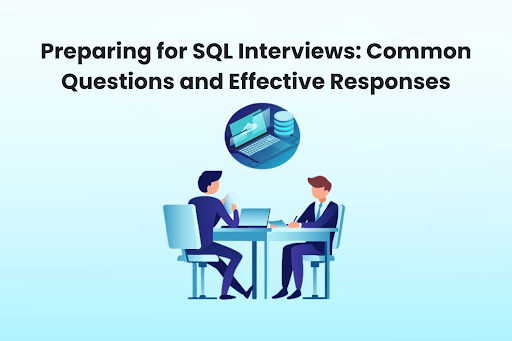Starting a data management and analytics career often requires learning SQL, a basic language for managing and modifying relational databases. The need for people with a solid understanding of SQL fundamentals will only grow as technology improves. Achieving success in an SQL interview is essential to obtaining your ideal career, regardless of your experience level as a database administrator or your intention to enter the profession via an SQL Course.
In this blog, we will look at frequently asked SQL Interview Questions and provide well-crafted answers highlighting your technical expertise and capacity for critical thought and problem-solving.
Table of Contents
- Understanding the Basics
- Basic SQL Interview Questions
- SQL Course for Success
- Tackling Advanced SQL Interview Questions
- Subqueries
- Transactions and ACID Properties
- Optimising Query Performance
- SQL Interview Questions Going Beyond the Syntax
- Indexing Strategies
- Stored Procedures and Functions
- Conclusion
Understanding the Basics
Before diving into SQL interview questions, it is critical to grasp the fundamentals. Many interviews begin with basic questions to gauge your background knowledge level. Anticipate queries on indexing, normalisation, and the distinctions between primary and foreign keys, among other database principles. These fundamental ideas may be solidified with the help of comprehensive SQL training, which will boost your confidence while answering these first questions.
Basic SQL Interview Questions
SELECT
You’ll probably hear the omnipresent SELECT statement throughout your interview. Be ready to explain its meaning and variants. Go one step further and show that you can utilise the WHERE clause for sorting and filtering. Demonstrate your expertise by talking about how you would get specific data from a database, just like locating applicants who know SQL.
JOIN
It’s common for interviewers to assess your ability to combine data from many tables. The key is understanding the various JOIN operation types: LEFT, RIGHT, and INNER. Demonstrate your expertise by outlining the appropriate usage of each kind, showing prospective employers that you can easily navigate relational database complexity.
GROUP BY
It’s critical to demonstrate your grasp of data summary. Common questions include GROUP BY and aggregate functions such as AVG, COUNT, SUM, and MAX/MIN. Express clearly how you would utilise them to get valuable insights from huge datasets, demonstrating your ability to manage real-world situations.
SQL Course for Success
Taking structured SQL training may significantly impact your interview readiness. These courses give hands-on practice, realistic settings, and a thorough grasp of SQL. Completing a well-crafted SQL course gives you the competence and self-assurance required to address the wide variety of SQL interview questions you may encounter.
Tackling Advanced SQL Interview Questions
Subqueries
Subquery-based inquiries may come up throughout the interview process. Demonstrate your problem-solving ability by outlining how you would utilise subqueries to get specific data and supporting your answers with concise examples. This exhibits theoretical understanding and real-world application, a highly regarded trait among SQL experts.
Transactions and ACID Properties
Look at the ACID qualities (Atomicity, Consistency, Isolation, Durability) and transactions. Show that you comprehend how these guidelines provide consistency and integrity of data in a database. An interviewer may provide a hypothetical scenario where transactions must be handled skilfully; be ready to demonstrate your thinking in such situations.
Optimising Query Performance
A thorough understanding of query speed optimisation is necessary to ace an advanced SQL interview. Anticipate being questioned about your use of execution plans to optimise slow-performing queries. Explain how you find bottlenecks, read through plans of action, and put good indexing techniques into practice to improve query performance. Provide examples of how you’ve enhanced query performance to show you can troubleshoot and fine-tune SQL queries for the best outcomes. This advanced skill set presents you as a helpful asset in ensuring databases function smoothly and effectively and showcasing your technical expertise.
SQL Interview Questions Going Beyond the Syntax
Indexing Strategies
One of a database administrator’s most important responsibilities is optimising database performance. Anticipate inquiries about indexing techniques and how they affect read and write operations. Talk about situations when you would choose one kind of index over another, highlighting your capacity to make deft choices to improve database performance.
Stored Procedures and Functions
Navigate through questions about functions and stored procedures. Showcase how these database objects provide simplified processes and code reusability. Provide examples from your SQL course where you used stored procedures to effectively handle challenging issues, demonstrating your hands-on expertise.
Conclusion
To ace SQL interview questions, you need to have a solid understanding of theory, hands-on training, and clear communication of your reasoning. Enrolling in an organised SQL course gives you the tools to use what you’ve learned in practical situations. As you prepare for your SQL interview, remember that it’s not only about learning syntax—you also need to show that you can solve problems and adjust to different kinds of database issues.
You’ll be well on your way to impressing prospective employers and landing that dream job in the fast-paced field of data management with a strong foundation and insightful answers.














